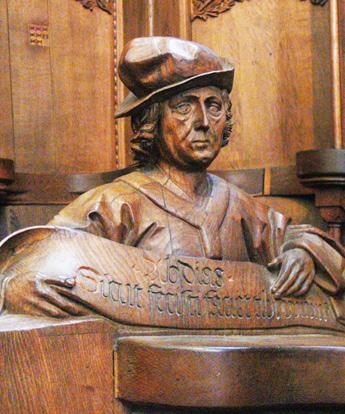
4 minute read
Understanding the Prophet Obadiah by Fr Chris Clohessy
Reading the Prophet Obadiah
Fr Chris Clohessy
There are twelve prophets in the Old Testament, described as ‘minor’; and while most people have heard of Amos or Hosea, few have heard of Obadiah or would know where to look for him, hidden in the heart of the bible.
His name means ‘servant’ or ‘worshipper’ of the Lord’. Probably he was King Ahab’s servant and received the gift of prophecy because of a moment of inspiration, when he hid a hundred prophets (1 Kings 18:4) from Ahab’s dangerous wife, Jezebel. He did this in two caves of fifty each, so that if those in one should be discovered, those in the other might yet escape.
Obadiah is fourth of the minor prophets, and his book deals with the terrible consequences of sibling rivalry. It is a discomforting read; Obadiah presents a God who appears angry and unyielding, his rage directed especially towards the House of Edom, the original tribe of Esau. Obadiah is recognized for his belief in the law of retaliation, as a theme deeply enmeshed in the language of the book; it is poetic justice, he notes, that ‘as you have done, it shall be done to you; your deeds shall return on your own head’. It is a short text, 21 verses, rooted in an unhappy history of a set of twin brothers.
Abraham marries Sarah; their son Isaac marries Rebekah; Isaac and Rebekah have two sons: Esau, the elder and Jacob, the younger. When in Gen. 25 Rebekah asked the meaning of the struggle going on in her womb, she learns from God that these two boys represent two nations: ‘One nation shall have mastery over the other, and the elder shall serve the younger’ (Gen. 25:23). From the very beginning, the boys are rivals. When they grow older, Jacob haggles with Esau to exchange his birthright for some edible ‘red stuff’: this is the phrase used by the text – the word for red in Hebrew is where the name
© Andreas Praefcke
The Prophet Obadiah on the choirstalls of the monastery at Blaubeuren
‘Edom’ comes from. Later, with his mother’s help, Jacob deceives his father (Isaac) into giving him his one and only blessing, which makes Jacob the heir of all his father’s possessions. The older brother Esau, who should have been sole heir, is left with a lifelong hostility towards his brother, seen in his resolve to kill Jacob after losing his birthright (Gen. 27:41): it re-emerges later when Edom revolts against the kingdom of Judah, fulfilling the prediction of Isaac, that Esau would ‘break loose’ from his brother (Gen. 27:40)
Esau’s descendants became the nation of Edom, while Jacob’s, his name changed to Israel, grew into the nation that still carries that name. The conflict that began at birth between two brothers results in enmity between two entire nations, as division deepened and became more dangerous, resulting in years of violence and loss of life. It is a reminder of what happens when conflicts, even on the level of family, are handed on from one generation to the next; here, Esau and Jacob’s lives intersect with our own. The names and circumstances might be different, but we know how divisive individual conflicts affect the entire and extended family. Sometimes, even though it is difficult to remember the details and how the conflict first began, the divisions remain.
When Judah was invaded in the 6th century BC, the enemy sacked Jerusalem. The Edomites, descendants of Esau, made a fateful error of judgment, siding with the enemy, helping them to loot the city. Speaking many years after that initial conflict between brothers, Obadiah recounts the ways that Edom turned against his brother’s nation and sided with Israel’s enemies. He mentions the pillage, as well as the occasions when Edom supported alien powers. The prophet condemns the House of Edom for ‘gloating over his brother’s misfortune’ and ‘playing the braggart on the day of distress.’ ‘On the day you stood silent while strangers carried off his wealth and foreigners entered his gates and cast lots for Jerusalem, you were like one of them’.Then Obadiah describes Edom’s punishment: ‘The House of Esau will become stubble. They will set it alight and burn it up (Obadiah 1:18)’.
It is heart-breaking when family members are at odds, when closeness ends and people are exiled from each other, often in a grim silence or raging anger that lasts for years. Exile is not geographical; people can be exiled in their own countries, own homes, even their own room. But when their enmity grows beyond family boundaries, the consequences are devasting. Even today, some nations and peoples, once united, have become divided between north and south, east and west; some regions are intensely divided among their groups of inhabitants; and there can be significant conflicts among regions within a nation or in neighbourhoods within cities. Obadiah reminds us that violence begets violence and that we should put an end to these squabbles and grievances at the moment they start.










